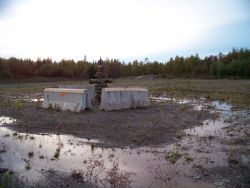Halifax Media Co-op
News from Nova Scotia's Grassroots
NOFRAC analysis of party responses
NOFRAC asked: If your party controls the government, will your government extend the existing moratorium on hydraulic fracturing and legislate a 10-year moratorium on fracking?
If not, what conditions would have to be satisfied before your party would consider lifting the present moratorium on fracking?
OVERVIEW
NOFRAC would have liked to see all firm yeses in response to our question whether the parties would support a 10-year legislated moratorium or a ban on hydraulic fracturing.
-
Except for the Green Party, none of the parties are currently prepared to take a stance to ban fracking permanently or legislate a ten-year moratorium. NOFRAC believes the existing independent science as well as the increasing evidence of problems where shale gas is presently being developed provides sufficiently strong evidence to support a 10-year moratorium or ban at this time, and we are disappointed that all parties do not recognize this.
-
For example: Evidence of aquifer contamination, evidence of the existence of pathways which can allow migration of contaminants released by fracking to move from the shale layer to aquifers,continued high well leakage rates (5% in the first year, up to 60% after 30 years), significant gaps in the capacity to enforce regulations or accurately document problems, for example decreased inspections even as well numbers increase, the unsolved problem of disposal of billions of litres of contaminated fracking wastewater, increased cancer and other public health impacts, and studies indicating that multiple methane leaks in the shale gas extraction process make shale gas as much of a climate threat as coal.
POSITIVE CHANGES
Over the last two years, discussion in Nova Scotia about fracking and shale gas extraction has been intense. All parties seem to have moved ahead from their positions as stated in January 2013 in the Chronicle Herald. All parties now hold positions that reflect a greater understanding of the potential harm and greater concern for the potential for harm.
-
We believe this change is in large part due to the fact that throughout the province people of all political persuasions have made it clear that fracking is an issue of great concern for the well being of Nova Scotia.
-
All parties now appear to recognize that hydraulic fracturing goes beyond a narrow technical question of HOW to extract resources using “best practices” and updated regulations. The NDP and the Liberal parties now appear to recognize that whether fracking can be done safely is an IF question, not merely a HOW question. Discussion has moved beyond the narrow question of how to regulate, to a discussion about whether this type of natural gas extraction can be carried out without serious harm.
-
The Progressive Conservative party still seems to believe that fracking might be permissible if very good regulations are adopted and there is no local bylaw that prohibits fracking.
-
All parties now seem to recognize that a wide range of issues needs to be considered, beyond the crucial environmental issue of risks to water. There is some variation between parties in the range ofissues recognized. It is not clear from the general language in the parties’ responses how deeply the parties understand the widespread risks, including public health, risks to existing industries, and hidden, downloaded costs to municipalities and individuals. We hope the Wheeler review will, as announced, look carefully at a wide range of issues and their implications for NS in the short, medium and long term.
DEFICIENCIES
- NOFRAC would have appreciated more detail in PC response.
-
NOFRAC would have appreciated more detail in NDP response. We are disappointed that the NDP’s stated conditions for lifting the moratorium specify only harm to the environment, and do not also specify certainty that there will not be harm to public health, local industries and economies, or negative social impacts on rural communities, although these issues are now covered by the new review.
-
Election promises don’t always jibe with post-election actions. We hope the party’swords translateinto firm commitments , whichever party holds power after the election.
-
Neither the NDP or Liberals have mentioned whether they now support communities’ right to say no to fracking.
September 19, 2013
NOFRAC represents more than 100 members spread throughout Nova Scotia, including more than 15 environmental and community organizations. The coalition was formed in December 2010 to share information about the risks of hydraulic fracturing and the development of shale gas in Nova Scotia, and to raise public awareness about the risks of these practices.
The site for the Halifax local of The Media Co-op has been archived and will no longer be updated. Please visit the main Media Co-op website to learn more about the organization.



